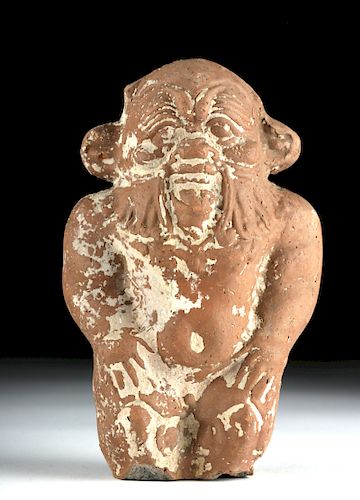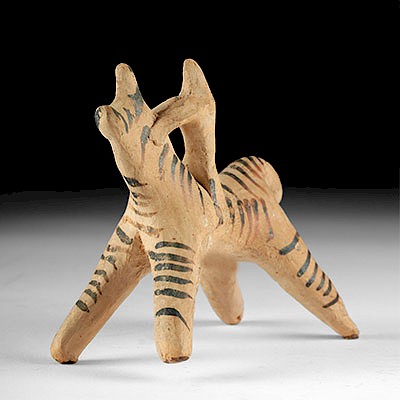Romano-Egyptian Alexandrian Terracotta Effigy of Bes
Lot 10d
About Seller
Artemis Fine Arts
686 S Taylor Ave, Ste 106
Louisville, CO 80027
United States
Selling antiquities, ancient and ethnographic art online since 1993, Artemis Gallery specializes in Classical Antiquities (Egyptian, Greek, Roman, Near Eastern), Asian, Pre-Columbian, African / Tribal / Oceanographic art. Our extensive inventory includes pottery, stone, metal, wood, glass and textil...Read more
Estimate:
$1,200 - $1,800
Absentee vs Live bid
Two ways to bid:
- Leave a max absentee bid and the platform will bid on your behalf up to your maximum bid during the live auction.
- Bid live during the auction and your bids will be submitted real-time to the auctioneer.
Bid Increments
| Price | Bid Increment |
|---|---|
| $0 | $25 |
| $300 | $50 |
| $1,000 | $100 |
| $2,000 | $250 |
| $5,000 | $500 |
| $10,000 | $1,000 |
| $20,000 | $2,500 |
| $50,000 | $5,000 |
| $100,000 | $10,000 |
| $200,000 | $20,000 |
About Auction
By Artemis Fine Arts
Oct 25, 2018
Set Reminder
2018-10-25 11:00:00
2018-10-25 11:00:00
America/New_York
Bidsquare
Bidsquare : Antiquities from Egypt, Greece, Italy, Asia
https://www.bidsquare.com/auctions/artemis-gallery/antiquities-from-egypt-greece-italy-asia-3538
Featuring Egyptian, Greek, Roman, Etruscan, Near Eastern, plus Asian art from Central and Far East. If you love the classics, this is the sale for you. Artemis Fine Arts info@artemisgallery.com
Featuring Egyptian, Greek, Roman, Etruscan, Near Eastern, plus Asian art from Central and Far East. If you love the classics, this is the sale for you. Artemis Fine Arts info@artemisgallery.com
- Lot Description
Egypt, probably Alexandria, Romano-Egyptian Period, ca. 1st century BCE to 1st century CE. A hollow, mold-made terracotta effigy figure depicting the dwarf deity Bes. The figure stands atop attenuated legs with a rotund abdomen flanked by hanging arms and hands held to his thighs, and broad shoulders frame his overall presentation. His visage is shown in great detail with petite eyes under multi-layered brows, puffy cheeks, a wide nose, an elaborate bead which is often interpreted as a lion's mane, and a gaping mouth with a hanging tongue. Thick traces of white-pink pigment envelop most of the obverse side. The deity Bes watched over the members of a household, particularly the women and children, and protected them with the magical sign "sa." Size: 3.75" W x 6" H (9.5 cm x 15.2 cm).
Alexandria was an important port town in Roman-controlled Egypt, and through it Roman culture and ideas came into the ancient kingdom. Part of this ideological movement included items, like this figure, produced by the healthy ceramic industry that sprang up in the city which produced domestic and funerary ware, votive statues, toys, and other items. Egypt of course had its own tradition of pottery items prior to the arrival of the Greco-Romans, but the Romans brought new forms of material culture that seem to have become quickly fashionable.
Provenance: private East Coast, USA collection; ex-Adeon Gallery, Chicago, Illinois, USA
All items legal to buy/sell under U.S. Statute covering cultural patrimony Code 2600, CHAPTER 14, and are guaranteed to be as described or your money back.
A Certificate of Authenticity will accompany all winning bids.
We ship worldwide and handle all shipping in-house for your convenience.
#139529Losses to areas of top of head, legs, and verso, with small nicks to most areas, fading to some finer details, as well as fading and chipping to applied pigmentation. Nice traces of pigmentation across obverse side, and light earthen deposits throughout. Old inventory number written in black ink on bottom of verso.Condition
- Shipping Info
-
All shipping is handled in-house for your convenience. Your invoice from Artemis Gallery will include shipping calculation instructions. If in doubt, please inquire BEFORE bidding for estimated shipping costs for individual items.
-
- Buyer's Premium



 EUR
EUR CAD
CAD AUD
AUD GBP
GBP MXN
MXN HKD
HKD CNY
CNY MYR
MYR SEK
SEK SGD
SGD CHF
CHF THB
THB
















